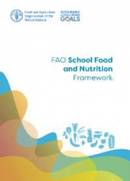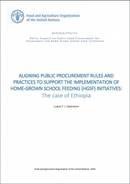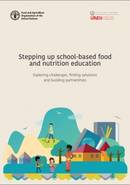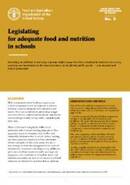المطبوعات
This guidance note describes an approach aimed at improving food security and nutrition through education systems, with a specific focus on schools. Furthermore, the note intends to support policy-makers, advisors and other relevant stakeholders in promoting greater coherence between education, agriculture, nutrition and other policies and programmes; particularly, on how the policy agenda for the education sector can be leveraged for better nutrition and food security without compromising its own priorities.
The FAO School Food and Nutrition Framework aims to support governments and institutions in developing, transforming or strengthening their school policies, programmes and other initiatives for an enhanced and synergistic impact on diets, child and adolescent nutrition, community socioeconomic development and local food systems.
The Framework represents a direct response to the international call for improving nutrition along the life cycle and for transforming food systems to be conducive of better diets, in the context of the Sustainable Development Goals (SDGs), the Second International Conference on Nutrition (ICN2) and the UN Decade of Action on Nutrition (2016-2025).
Building on the experiences of various countries and on an in-depth analysis of Ethiopia's public procurement rules and practices in the context of school feeding, the report provides recommendations on the alignment of public procurement rules and practices to support the implementation of HGSF initiatives in the country.
The consultation “Stepping up School-based Food and Nutrition Education: Exploring Challenges, Finding Solutions and Building Partnerships,” organised by FAO in collaboration with the United Arab Emirates University was the first specialized global meeting of its kind. It provided stakeholders from different fields of expertise working with school-based programmes a platform to discuss challenges and define priorities, competencies and educational innovations with the main focus on SFNE.
Multi-component school feeding programs are widely recognized as key instruments to achieve children’s right to adequate food, education and health. They can contribute to preventing hunger and malnutrition, address micronutrient deficiencies and encourage healthy eating habits, depending on their aims.





